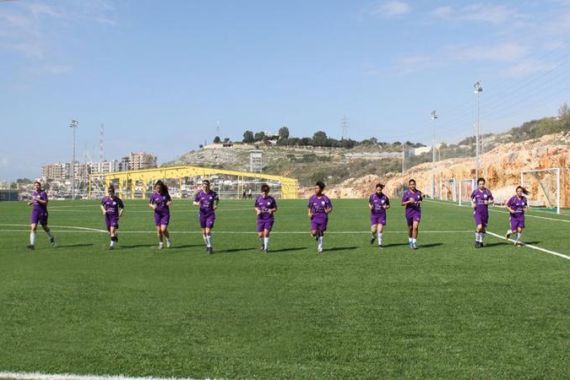Lebanon’s level playing field
Girls-only football club in Beirut increasing female interest and also gaining popularity in a patriarchal society.

In the locker room, fifteen footballers are sitting listening to their coach’s analysis.
There is no crowd of 80,000 waiting for them outside. This is not a pep talk ahead of a Champions League semi-final. All those 15 players are girls aged between 13 and 19. They are ready to play until they tell the world they exist and make people aware of the quality of their game.
Keep reading
list of 4 itemsDutchman Slot confirms he is taking Liverpool job next season
Man City know ‘it’s win or Arsenal will be champions’ of the Premier League
Manchester City and Arsenal: breaking down the EPL’s final day title fight
End of last month, those youngsters representing the Girls Football Academy (GFA) prepared to take on the Alley’s team SAS in the second round of the first national football competition for under-19 girls held in Lebanon. Out of the six participating clubs, GFA was the only all-female club.
We were like extras, a thing on the side, for the Lebanese teams, with no access to proper equipment and not enough time on the field to train
“The fact that we only train girls gives us the possibility to coach them better than a mixed club,” Walid Arakji, co-founder, trainer and player of GFA, told Al Jazeera.
“Here in Lebanon, football clubs focus mostly on their male players so the female involvement is quite limited. But at GFA, we take our youth training very seriously. They are the ones who can improve the most and go on to become part of the national team. That is where they can really make a difference for the country at an international level.
“I lived in France for 26 years and was used to see women play quite well but I noticed that girls weren’t given the time and the facilities in Lebanon that they deserved and, as a trainer, I got very frustrated,” Arakji added.
These thoughts were echoed by another female footballer Nadia Assaf who Arakji met in 2011.
“We were like extras, a thing on the side, for the Lebanese teams, with no access to proper equipment and not enough time on the field to train,” Assaf said.
Pioneers
Realising the situation, the pair decided to create the first girls-only football academy. This was a first not only in Lebanon but the whole region.
“That was our way to get rid of sexism on the field and to give women in Lebanon a different image,” Assaf added. But her partner was more moderate.
“Football is culturally a male sport everywhere in the world except for the US and Norway where it’s the opposite,” Assaf said. “Lebanon is no different but it’s far behind other countries on women’s rights.”
The strategy is simple: become as good as they can and catch the national federation’s eye, a move that could also attract sponsors, finances and public interest. Their wish was to allow women to train in good conditions but also to make a difference in Lebanon, a very patriarchal society.
“We have players who used to hide from their parents but now, in one example, this reluctant father is the biggest GFA supporter,” Arakji explained.
Limited support
As the girls left the locker rooms and ran onto the field, families, friends and fans shouted their support for 90 minutes – including ‘GFA, ole ole ole’ – and some young men entertained those present with some cheerleading with pompoms.
But the prejudice and the lack of acceptance on the streets is quite visible.
I was training with boys earlier and they were faster and stronger. But after a while with the GFA, I’ve realised that we can reach a good level too
“People that I don’t know are surprised when I tell them I play football,” Florence, 17, said with a smile. “My family and friends love sports but my taxi driver is really surprised if I tell him I go to training. It really depends on the person’s background.
“I was training with boys earlier and they were faster and stronger. It’s normal since they played more than us. But after a while with the GFA, I’ve realised that we can reach a good level too.”
Beyond their beliefs in gender equality, it is good training and team spirit that has helped GFA become popular (despite a rather expensive registration fee that helps pay for the training field’s rent which is by the sea on the western side of Beirut).
From 20 girls in 2011, the club has grown to over 50 registered players now aged eight to 35. Ten of those are under 13. There are also talks of taking the teams abroad ‘to see what a good level looks like’.
“It’s really good for the girls to be able to play like professionals on level playing field,” Arakji added. “It shows recognition for local female footballers and allows them to get more experience while also taking the sport seriously.”
The players love it and it showed in their 5-0 win on that Sunday morning.